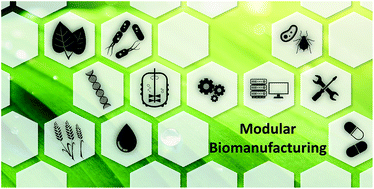Modular biomanufacturing for a sustainable production of terpenoid-based insect deterrents†
Abstract
Synthetic agricultural insecticides are toxic to many species and accumulate in the environment. Therefore, the development of target-specific and biodegradable insecticides and deterrents is in demand. This study describes an improved and sustainable process for the green production of a biological insect repellent based on the diterpene cembratriene-ol (CBT-ol). This compound is a natural part of the tobacco (Nicotiana sp.) plant's defense against insects and thus minimizes damage to the environment. The study reports a new recombinant (E. coli) CBT-ol production and purification system. Efficient production was achieved by ribosomal binding site combinatorics using the BioBrick assembly system. These methods generated a metabolically balanced microbial system capable of generating 78.9 ± 2.4 mg L−1 CBT-ol in a 50 L bioreactor. Fermentations were entirely carried out on enzymatically generated wheat bran hydrolysate, representing a waste fraction of the grain milling process. The application of this complex and cost-efficient cultivation medium enabled an ecologically and economically sensible production of this high-value insect deterrent. Moreover, an ecologically favorable downstream processing protocol was established, combining adsorptive CBT-ol capture and centrifugal partition chromatography (CPC) followed by HPLC-based isomer separation. This is the first report using CPC to recover recombinant-generated, bioactive terpenes. The methodology enabled 95% CBT-ol recovery and purification in a single CPC step with significantly reduced solvent consumption in comparison to conventional chromatographic methods. In vivo and in vitro bioactivity studies confirmed the insecticide characteristics but also indicated that CBT-ol shows other bioactivities specifically targeting Gram-positive bacteria.



 Please wait while we load your content...
Please wait while we load your content...